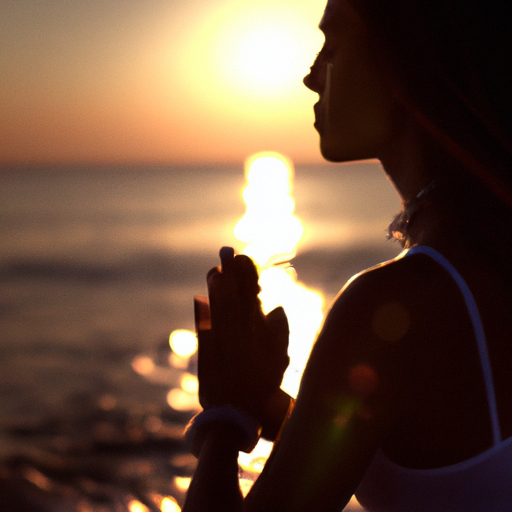
Have you ever wondered if Reiki healing is associated with any specific religion? Well, you’re not alone! Reiki healing is a practice that has been gaining popularity in recent years, but its origins and spiritual beliefs can sometimes be confusing. In this article, we’ll explore the question of whether or not Reiki healing is linked to any particular religion, and provide you with a better understanding of this unique and holistic form of therapy.
Reiki healing is actually not associated with any specific religion. Although it originated in Japan, Reiki is a spiritual practice that focuses on the universal life force energy that flows through all living beings. It does not require any specific set of beliefs or religious affiliation. In fact, people from diverse religious backgrounds can practice and benefit from Reiki. Whether you’re a Christian, Muslim, Buddhist, or anyone else, Reiki can be integrated into your spiritual journey without conflicting with your existing beliefs. So, if you’re interested in exploring Reiki healing, rest assured that it embraces a non-denominational approach and can complement your existing spiritual practices. In the following article, we will delve deeper into the principles and techniques of Reiki healing, and provide you with a comprehensive understanding of its benefits and how it works.
Overview of Reiki Healing
Reiki healing is a holistic practice that aims to restore balance and promote well-being in the body, mind, and spirit. It involves the transfer of energy through the palms of the practitioner’s hands to the recipient, promoting relaxation, stress reduction, and healing. While Reiki is often associated with spirituality, it is important to explore whether it is affiliated with any specific religion or belief system.
Definition of Reiki Healing
Reiki is a Japanese word that means “universal life energy.” It is believed that this energy flows through all living beings and is essential for maintaining physical, emotional, and spiritual health. Reiki healing is the channeling and directing of this universal energy to restore balance, stimulate the body’s natural healing abilities, and promote overall well-being.
History of Reiki Healing
Reiki healing originated in Japan in the early 20th century. It was developed by Mikao Usui, a Japanese Buddhist monk, who sought to find a method of healing that could be accessible to anyone regardless of their religious or cultural background. Usui’s teachings were passed down to his students, who then trained others, creating a lineage of Reiki masters.
Basic Principles of Reiki Healing
At the core of Reiki healing are five basic principles or affirmations that serve as a guide for practitioners. These principles include “Just for today, I will not be angry,” “Just for today, I will not worry,” “Just for today, I will be grateful,” “Just for today, I will do my work honestly,” and “Just for today, I will be kind to every living thing.” These principles emphasize the importance of mindfulness, gratitude, and compassion in one’s daily life.
Benefits of Reiki Healing
Reiki healing offers numerous benefits to individuals, irrespective of their religious or spiritual beliefs. It is often practiced to reduce stress, relieve pain, enhance relaxation, improve sleep, and promote overall well-being. Reiki is also known to support emotional healing and personal growth, as it assists in releasing emotional blockages and promoting self-awareness.
Exploring the Spiritual Aspect
Spirituality vs. Religion
It is important to distinguish between spirituality and religion when discussing Reiki healing. While religion typically relates to specific beliefs, rituals, and organized practices, spirituality is often seen as a more individualistic and personal connection with the divine or higher power. Reiki healing aligns more with spirituality, as it is a practice that focuses on connecting with and channeling universal life energy rather than adhering to specific religious doctrines or dogmas.
Concept of Universal Life Energy
Central to Reiki healing is the belief in the existence of universal life energy, which flows through all living beings. This concept is not tied to any particular religious faith but rather represents a fundamental understanding of the interconnectedness and interdependence of all life forms. Reiki practitioners harness this energy to promote healing and well-being, regardless of their religious beliefs.
Link between Reiki and Spiritual Practices
Although Reiki is not inherently tied to a specific religion, it often finds a place within various spiritual practices. Many people who practice Reiki also engage in meditation, mindfulness, and other forms of spiritual or self-care practices. The common thread between these practices is the pursuit of personal growth, spiritual connection, and overall well-being.
Reiki as a Tool for Personal Growth
Reiki healing can be seen as a tool for personal growth and self-discovery, as it encourages individuals to explore their own beliefs, values, and experiences. Through Reiki, practitioners learn to become more attuned to their own energy and gain insights into their physical, emotional, and spiritual well-being. This process allows for personal transformation and the cultivation of a deeper connection with oneself and others.

Connections to Eastern Religions
Origins in Japanese Buddhism
Although Reiki healing does not align with any specific religion, it does have roots in Japanese Buddhism. Mikao Usui, the founder of Reiki, was deeply influenced by Buddhist teachings and sought to develop a healing practice that could be accessible to people of all religious backgrounds. However, Reiki itself is not considered a Buddhist practice, and individuals of any faith can practice and benefit from it.
Influence of Shintoism
In addition to Buddhism, Shintoism also played a role in the development and practice of Reiki healing. Shintoism, an indigenous religion in Japan, places a strong emphasis on the connection between humans and nature. This belief in the interdependence of all living things aligns with the principles of Reiki, which emphasize the interconnectedness of life energy.
Relationship with Taoism
Taoism, an ancient Chinese philosophy and religion, also shares some similarities with Reiki healing. Taoism emphasizes living in harmony with the natural order of the universe and cultivating the flow of qi, or life energy. This concept of energy and balance is reflected in Reiki healing, which focuses on channeling and balancing universal life energy for healing and well-being.
Reiki Masters and their Lineages
Reiki healing is traditionally passed down through a lineage of Reiki masters. Each Reiki master learns from their teacher and then becomes a master themselves, thus continuing the lineage. While some lineages may have connections to specific religions, the practice of Reiki itself is not limited to any particular religious or spiritual tradition.
Reiki and Western Religions
Compatibility with Christianity
Reiki healing has gained popularity among individuals who identify as Christians, as it does not conflict with the core beliefs of Christianity. While some Christian denominations may have reservations about practices that involve energy healing or non-traditional methods, many Christians find that Reiki can complement their faith by promoting healing, relaxation, and spiritual well-being.
Reiki’s Perception in Islam
The perception of Reiki among Muslims varies, as Islam does not have a specific stance on energy healing practices. Some Muslims may view Reiki as compatible with their faith, while others may have reservations due to cultural or religious beliefs regarding alternative healing methods. It ultimately depends on the individual’s interpretation and understanding of Islamic teachings.
Views from Judaism
Judaism, like other religions, encompasses a wide range of beliefs and practices. Some Jewish individuals may find that Reiki aligns with their beliefs and can be integrated into their spiritual lives. However, others may have concerns about the potential for idolatry or the blurring of boundaries between Jewish practices and non-religious systems, such as Reiki healing.
Integration into New Age Spirituality
Reiki healing is often associated with the New Age movement, which encompasses a broad range of spiritual beliefs and practices. New Age spirituality emphasizes personal transformation, holistic healing, and the integration of various spiritual traditions. In this context, Reiki is seen as a tool for spiritual growth and self-care, rather than being tied to any specific religious affiliation.

Debates and Controversies
Critics’ Perspectives on Reiki
Critics of Reiki often question its scientific validity and argue that the effects experienced by recipients may be attributed to the placebo effect. Skeptics argue that since Reiki healing involves energy transfer that is not recognized by mainstream science, its efficacy cannot be proven. However, proponents of Reiki assert that the personal experiences and testimonials of those who have benefited from Reiki’s healing effects should not be discounted.
Concerns about Cultural Appropriation
Some individuals raise concerns about the cultural appropriation of Reiki, as it originated in Japan and has been influenced by Eastern philosophies and practices. Critics argue that its widespread adoption by individuals from different cultural backgrounds may dilute or misrepresent its original intent. It is important for practitioners to approach Reiki with cultural sensitivity and respect for its origins.
Challenges Within Religious Institutions
Reiki healing has faced challenges within some religious institutions, where it may be viewed as inconsistent with established religious practices or teachings. Some religious leaders have critiqued Reiki as an esoteric or occult practice that should not be integrated into their faith communities. However, there are also religious leaders who advocate for the inclusion of Reiki as a complementary practice to promote holistic well-being.
Responses and Defense from Reiki Practitioners
Reiki practitioners often respond to critics by highlighting the personal experiences of their clients and the positive effects that Reiki healing has had on their physical, emotional, and spiritual well-being. They emphasize that Reiki is a non-invasive practice that respects individuals’ personal beliefs and is accessible to people from all walks of life. Reiki practitioners also emphasize the importance of transparency and informed consent when offering their services.
Reiki as a Non-Denominational Practice
Emphasis on Universal Healing Energy
Reiki healing is considered a non-denominational practice because it focuses on universal healing energy rather than specific religious beliefs or rituals. The basic principles and techniques of Reiki can be practiced by individuals of any faith or no faith at all. The intention behind Reiki is to promote healing, relaxation, and well-being, regardless of one’s religious or spiritual background.
Inclusivity and Openness
One of the defining characteristics of Reiki healing is its inclusivity and openness to individuals of diverse backgrounds. Reiki practitioners strive to create a safe and welcoming environment where anyone can receive healing energy regardless of their beliefs, gender, ethnicity, or sexual orientation. The practice of Reiki encourages compassion, acceptance, and respect for all.
Personal Belief Systems in Reiki
Reiki practitioners often emphasize that Reiki does not require individuals to adopt any specific belief system. While some practitioners may have personal spiritual or religious beliefs that inform their practice, Reiki itself is not tied to or reliant upon any particular set of beliefs. Individuals are free to interpret and incorporate Reiki into their lives in a way that aligns with their own values and belief systems.
Examples of Reiki Practitioners
The diverse range of individuals who practice Reiki exemplifies its non-denominational nature. Reiki practitioners come from various religious, spiritual, and cultural backgrounds, including Christians, Muslims, Buddhists, Hindus, atheists, and individuals who identify as spiritual but not religious. This inclusivity is a testament to the flexibility and adaptability of Reiki as a healing practice.
Reiki’s Role in Personal Faith
Enhancing Spiritual Connection
For many individuals, Reiki healing can enhance their spiritual connection and deepen their understanding of their own faith or belief system. The relaxation and heightened state of awareness that Reiki promotes can support individuals in accessing their own intuition, connecting with their inner selves, and experiencing a sense of spirituality that aligns with their personal beliefs.
Complementing Religious Beliefs
Reiki healing can complement and support individuals’ religious beliefs by providing a tool for healing, relaxation, and personal growth. Many practitioners find that Reiki enhances their existing spiritual practices, helping them to cultivate a deeper connection with their faith and integrate their beliefs into their daily lives. It is important, however, for individuals to discern how Reiki aligns with their faith and seek guidance from their religious leaders if needed.
Individual Interpretations of Reiki
As a non-denominational practice, Reiki allows for individual interpretations and experiences. Each person’s experience of Reiki healing may be unique, influenced by their own beliefs, experiences, and spiritual or religious background. Reiki practitioners respect and honor these individual interpretations, as they recognize that each person’s healing journey is personal and subjective.
Experiences and Testimonials
Many individuals have shared their profound experiences and testimonials about the transformative effects of Reiki healing. These accounts span across various religious and spiritual backgrounds, highlighting Reiki’s ability to complement and enhance personal faith. Whether it is finding emotional healing, experiencing a deep sense of peace, or gaining clarity and insight, these personal stories demonstrate the power of Reiki as a healing modality.
Ethical Considerations
Respecting Religious Boundaries
Reiki practitioners place great emphasis on respecting religious boundaries and individual beliefs. It is essential for practitioners to foster open dialogue and ensure that clients feel comfortable discussing any concerns or questions related to their religious or spiritual background. Understanding and honoring religious boundaries helps maintain a safe and inclusive environment for all individuals seeking Reiki healing.
Informed Consent and Disclosures
Reiki practitioners have a responsibility to provide clear and transparent information about Reiki healing and its non-denominational nature to potential clients. Informed consent ensures that individuals have the necessary knowledge to make an informed decision about receiving Reiki and understand that it is not specific to any religion. Practitioners should also disclose their own training, certifications, and any affiliations they may have with religious or spiritual organizations.
Responsible Integration of Reiki
Practitioners who integrate Reiki into religious or spiritual settings should do so responsibly and with sensitivity to the beliefs and practices of the community. It is important to engage in open dialogue with religious leaders and seek their guidance and input when incorporating Reiki into existing religious rituals or practices. This collaborative approach ensures that the integration of Reiki is done in a respectful and inclusive manner.
Transparent Communication with Clients
Effective and transparent communication with clients is crucial in fostering trust and understanding. Reiki practitioners should maintain an open dialogue with clients, encouraging them to share any concerns or questions they may have regarding the religious implications of Reiki healing. Clear communication helps dispel misconceptions and ensures that clients feel respected, valued, and fully informed about the practice of Reiki.
Exploring Diverse Perspectives
Interviews with Reiki Practitioners
Interviews with Reiki practitioners from various religious and spiritual backgrounds can provide valuable insights into the ways in which Reiki is integrated into different belief systems. These interviews can shed light on the personal experiences, challenges, and benefits that practitioners have encountered on their healing journeys, and how the practice of Reiki resonates with their religious or spiritual beliefs.
Experiences from Clients
Listening to the experiences of clients who have received Reiki healing can offer a deeper understanding of how Reiki intersects with their religious or spiritual beliefs. By sharing their stories, clients contribute to a diverse narrative that reflects the broad range of individuals who have found healing and support through Reiki, regardless of their religious background.
Insights from Religious Leaders
Religious leaders play a vital role in shaping the perspective of their congregations and communities. Their insights and perspectives on Reiki healing can provide valuable perspectives on its compatibility with specific religious beliefs and practices. Engaging in dialogue with religious leaders allows for a respectful exchange of ideas and fosters mutual understanding between Reiki practitioners and religious communities.
Academic and Scholarly Research
Academic and scholarly research can offer nuanced perspectives on the relationship between Reiki healing and different religions. These studies may examine the beliefs and experiences of Reiki practitioners and the potential impacts of Reiki on various aspects of well-being. By analyzing the existing research, practitioners can gain a deeper understanding of the diverse perspectives and debates surrounding Reiki and its association with specific religions.
Conclusion
In conclusion, Reiki healing is not associated with any specific religion. It is a non-denominational practice that focuses on harnessing universal life energy for healing, relaxation, and overall well-being. While Reiki may have roots in Eastern spiritual traditions such as Buddhism, Shintoism, and Taoism, it has evolved into a practice that can be embraced by individuals from all religious, spiritual, and cultural backgrounds. As individuals seek to enhance their spiritual connection, complement their religious beliefs, or navigate personal faith, Reiki healing offers a non-dogmatic and inclusive approach to healing that respects and honors diverse beliefs and practices.










